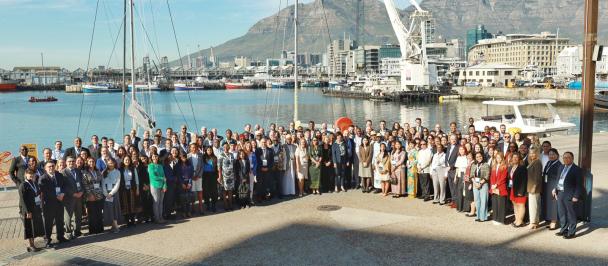Written by: Kyra Lunderstedt, Lehman Lindeque & Cobus Theron
Approval of Small Grants to enable Sustainable Land Management
August 3, 2020
Photo: JP le Roux
Small Grant Proposal Loxton
The Karoo system, largely dominant in the Northern and Eastern Cape Provinces of South Africa has been faced with severe and prolonged drought, which coupled with unsustainable land-use practices has crippled communal and commercial farmers alike. With degradation amounting on once productive grazing systems, turning to improved grazing management and other livelihood options which utilize the natural resources sustainably is key to the UNDP GEF5 Sustainable Land Management (SLM) Project success. The project, which is in partnership with the Department of Forestry, Fisheries and Environment (DFFE) and the Department of Agriculture, Land Reform and Rural Development (DALRRD), recently approved two Small Grant projects which will have direct impact toward addressing degradation and building resilience to drought and long- term climate change through adaptation strategies in the Karoo.
The Endangered Wildlife Trust (EWT) as a responsible partner to the project, will be overseeing the implementation of the Small Grants which will promote innovative approaches toward improved SLM through improved fencing of the Loxton Commonage and the establishment of a Mountain-bike trail in Nieuwoudtville to extend the eco-tourism season and support more sustainable livelihoods.
Photo: JP le Roux
1. Fencing, stock watering and rotational grazing on the Loxton Commonage
Emerging commonage farmers who completed the Integrated Farm Planning course (developed by EWT and UNDP as part of the SLM Project) were invited to identify a critical SLM issue on their land and apply for a small grant to address the issue. From the start, the farmers were involved in developing the proposals with the regional extension officer and an independent agricultural advisor to provide the enabling environment necessary for the adoption of SLM. The plans for the project were approved by the Ubuntu Local Municipality and will see direct benefit to three farmers and the improved management of 2 600 hectares of commonage land.
Going forward, the EWT will assist the three livestock farmers to develop management plans for their individual camps that are ecologically planned according to the veld type. The small grant will be used to ensure a reconfiguring of internal fencing and water points to ensure that each farmer can practice rotational grazing. By facilitating rotational grazing, the veld can rest and recover, and livestock numbers will be monitored seasonally. While the small grant will be used to buy fencing and water point materials, the farmers will commit to using their resources to construct the infrastructure and implement the management plan.
It is anticipated that the project will have a socio-economic impact through improving productivity of the veld and livestock, building resilience of the land and farmer and growing the farmers capacity and knowledge of farming and grazing systems. The expected improvements in livelihoods and wellbeing, will have positive co-benefits for the families of the farmers through increases in food production and food security. We hope to demonstrate with this project that enhanced SLM can be implemented on commonage systems.
Photo: Papkuilsfontein
2. Mountain bike trails for improved SLM through ecotourism and Biodiversity Stewardship
The farm of Papkuilsfontein is a 7000 ha sheep farm in Nieuwoudtville that offers accommodation during the Namaqua Flowering season. The farm has been affected by climate change through an erratic and unpredictable flowering season and a worsening agricultural outlook. This has negatively impacted the farmer and farm workers by increasing their vulnerability and reducing the income security.
The development of a 65 km mountain-bike trail will allow the land owners to reduce their dependency on sheep farming and extend the eco-tourism season. The Small Grant is inclusive of an “SLM exchange” from the landowner to commit to declaring the 7 000 ha as a Protected Environment under the Biodiversity Stewardship Programme. The EWT will assist the farmer in developing a management plan for the farm which will include reduction in livestock numbers, land rehabilitation and implementation of a rotational grazing system.
The trails will lead to the creation of new jobs and providing increased security of existing l jobs. This will have an economic impact on the households dependent on income from farming and the tourist season. The extension of the eco-tourism season will create up to four part-time jobs, three permanent jobs and two training opportunities. Additionally, the project will seek to employ and explore training opportunities for woman and young girls.
Small grant proposal PapkuilsfonteinMountain bike trails for improved Sustainable Land Management through ecotourism and Biodiversity Stewardship
Outcome 1 of the GEF5 SLM Project “Securing multiple ecosystem Benefit through SLM in the productive but degraded landscapes of South Africa”, aims to address land degradation by improving productivity through improved sustainable land management of 67 300 hectares across the country. The approved Small Grants are two of at least seven proposals that will be submitted by the EWT for the Karoo landscape. The project additionally implements in the dry grasslands of Machubeni in the Eastern Cape and in the Savannas of Sekhukhuneland in Limpopo. In Machubeni, Rhodes University as the projects responsible party has applied for a further 2 000 hectares to be under improved SLM and another 500 has of grassland to be restored, with a suite of socio-economic benefits to the community. The CSIR will additionally oversee the implementation of small grants to achieve SLM in the Olifants catchment. The UNDP GEF5 SLM Project looks forward to achieving further ecosystem and socio-economic impacts through SLM driven Small Grant Applications in the three biomes.

 Locations
Locations






